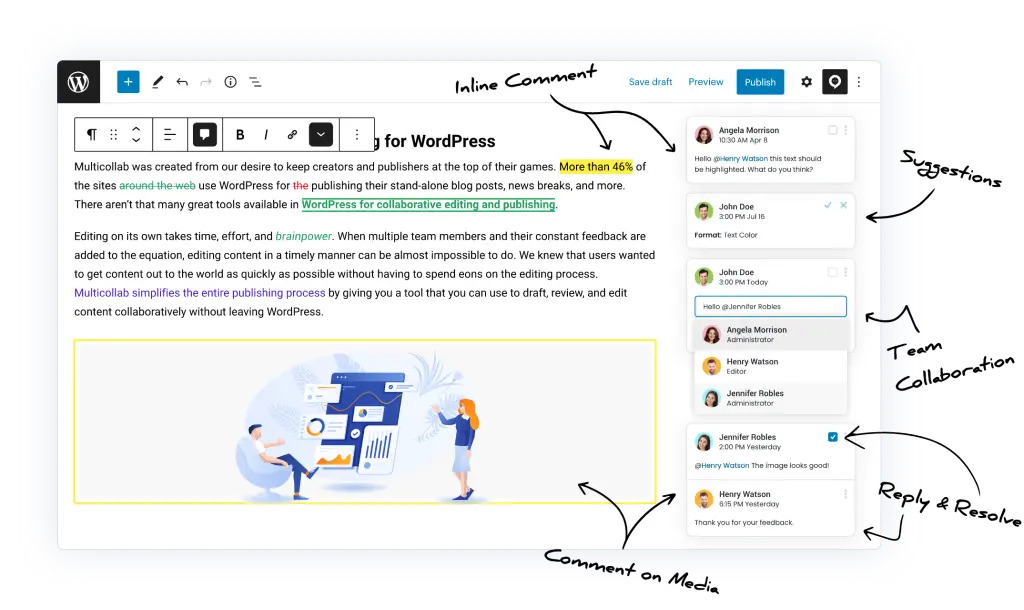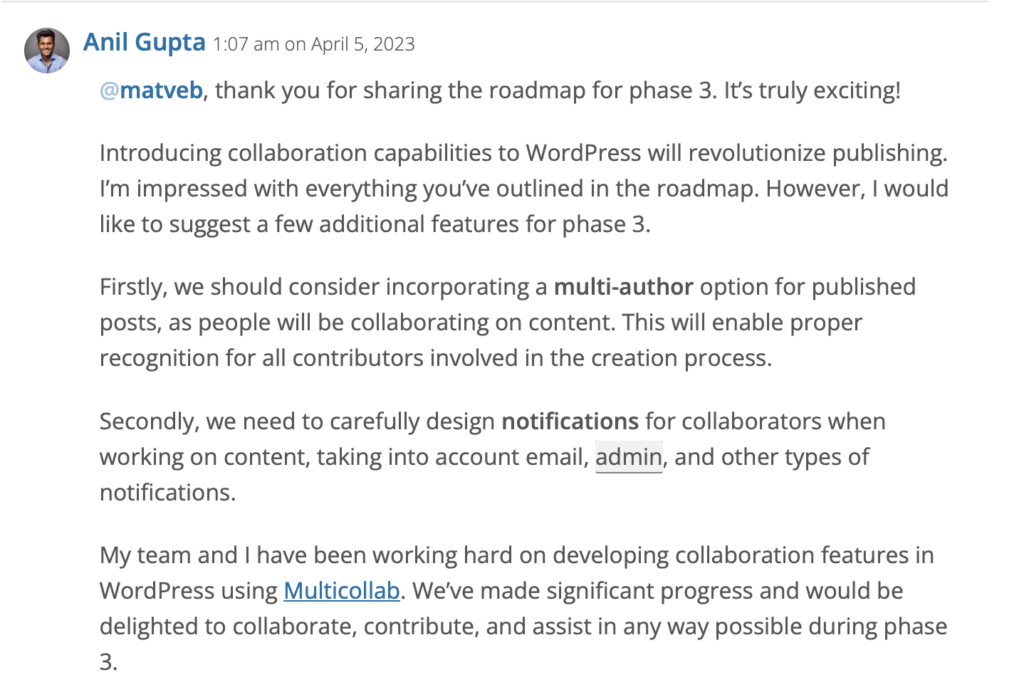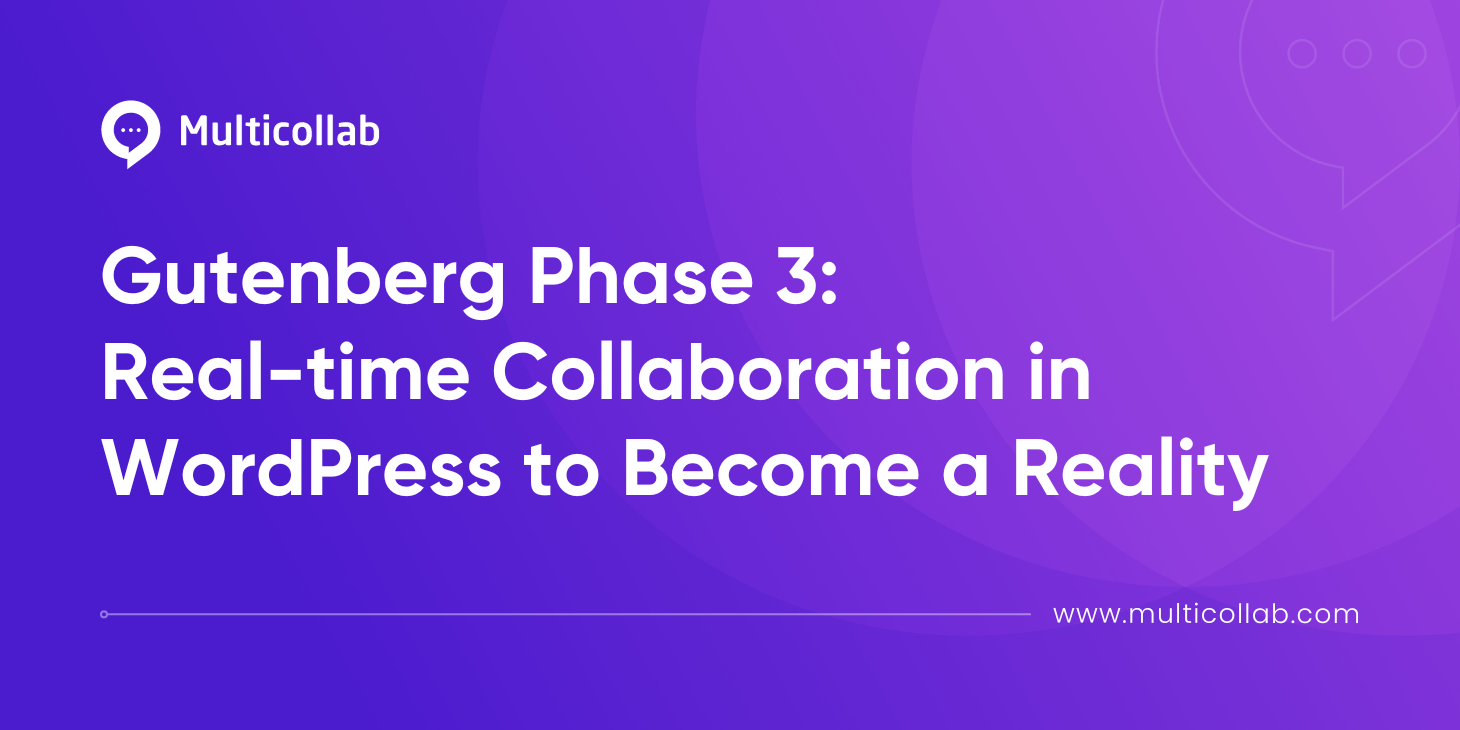Table of Contents
WordPress has always been a people’s favorite and rapidly evolving platform.
With a crystal clear vision to make the CMS (Content Management System) as seamless, flexible, and progressive as possible, the WordPress open-source community has always provided the freedom to create and manage content on the websites – the way we desire.
Introduced in WordPress 5.0, released in November 2018, the Gutenberg project plunged the CMS into the category of user-friendly builders that now offer a very intuitive web-building experience. The Gutenberg Block Editor revolutionized content creation, offering a more intuitive and visually driven approach to building websites.
Making it more approachable to non-coders, the Gutenberg project did make online publishing easier. However, it needed to have the capabilities to be projected as a core content creation platform.
Often highlighted for its lack of collaborative features, the Gutenberg project needed to come at par with content creation apps like Canva, Notion, Sketch, Google Docs, and Microsoft 365 for ‘Collaboration’.
The existing framework poses certain challenges for most content teams within WordPress when it comes down to content ‘Collaboration’:
- Copying and pasting content between Google Docs and WordPress leads to critical errors and wasted time.
- Upon directly working in the dashboard for posts, there’s no real way, by default, to leave comments for suggestions and feedback.
- For collaboration, the only meagre way out of a post is to let the other user take over for editing.
- Real-time editing was a distant dream within the WordPress ecosystem.
Collaboration in WordPress site: Multicollab steps up to the challenge
Our team at Multidots understood how challenging it was for teams of all sizes to get past these challenges and improve the efficiency of their collaborative output.
And that’s how Multicollab found its way to being; stepping up to fill these voids.
Multicollab launched two years ago to bring a Google Docs-style collaboration environment to WordPress. The commenting feature was introduced in 2021, and the suggestion feature was just a little behind in 2022. And following the recent release of version 3.3, this is only the start of where Multicollab is headed.

With the Multicollab plugin, users are now able to collaborate directly within WordPress with commenting, tagging, replying, and much more.
- Comment, suggest, and tag in the Gutenberg Editor
- Review videos and dynamic content
- Create custom roles and permissions
- Track changes in all drafts at once
Our team has been adamant about making this even better. The efforts at Multicollab came to fruition when real-time editing in Multicollab was added as a capability to the Multicollab plugin. As of today, it is still in the early beta stage.
So, for now, you can only test it on our server. But not to worry, we will notify you when it’s ready to test and use on your WordPress website.
Coming back to Gutenberg Phase 3, the project is also now ready to address the gaps and shift focus to ‘Collaboration’.
Real-time collaboration in the WordPress Gutenberg Block Editor
Matias Ventura, the lead architect of Gutenberg, recently shared an initial plan for the project’s upcoming “Collaboration” phase, which includes a focus on real-time collaboration. This feature, similar to what users have experienced in apps like Google Docs, is going to be a top priority.
Matias expressed the potential of real-time collaboration across all block editors, where users can work together seamlessly on content and designs without facing editing restrictions. The aim is to develop the necessary infrastructure and user interface to enable multiple users to collaborate on the same content simultaneously. Hence, simplifying the creation, editing, and customization of web pages and posts, as a team.
So, what does that change for the WordPress block editor?
Phase 3 will make lives easier with impeccable Content Management workflows. Your team will now be able to work together in unison and collaborate within WordPress.
- With no editing restrictions in place, WordPress content teams will have access to the real-time and asynchronous collaboration feature in their editors and site-wide.
- Multiple users can simultaneously work on the same content.
- Key features such as draft sharing for content and design changes, inline-block commenting, review assignments, improved version control, and task management will be incorporated.
- Make space for everyone by enabling collaboration for every individual’s pace and unique workflows.
In terms of site-wide capabilities, Phase 3 will have the following focus areas:
- Adding a visual level-up to the Post Revisions interface.
- Possible inclusion of the ability to schedule revisions across multiple parts of a site.
- Enhancing the admin design and navigation features with a more contemporary design and refined extensibility support for interactivity.
- A Library focus area aimed at enhancing the media library design, interactions, and extensibility.
Our CEO, Anil Gupta made some great suggestions for the roadmap in this interaction post by Matias mentioning how the roadmap can benefit from the inclusion of a multi-author option for published posts. He emphasized the need for proper recognition for all contributors involved in the creation process.
Anil also added that there was a need to carefully design notifications for collaborators when working on content, taking into account email, admin, and other types of notifications. As always, the Multicollab team is keen and excited to collaborate, contribute, and assist in any way possible during phase 3.

Other users also made some suggestions, such as making the editor’s UX better, improving the working of comments and search templates, being able to track revisions of metadata, and many more.
According to Ventura, the Collaboration phase won’t commence during the 6.3 release scheduled for August 2023. The WordPress contributors are currently focusing on refining the customization experience as they prepare to launch the Site Editor out of beta in the 6.2 release. He assured the readers that the projects related to previous phases, such as managing more blocks, improved tables, grid layout system, and block API roadmap, would continue.
While the course of action has been determined, the community plans to move ahead, keeping in mind how the phase unfolds with feedback and contributions all over. If you have something that can contribute to the collaboration phase, please feel free to drop a comment in the section of Matias’ post.
For Multicollab, this is just the beginning of a very large picture. We are dedicated to making the WordPress collaboration and editing experience as awesome as some of the other tools out there. And while we are at it, Gutenberg Phase 3 gives us major hope – that WordPress shall soon have its real-time collaboration features making waves across the globe.
You can also check out this WordPress Briefing podcast by WordPress Executive Director Josepha Haden Chomphosy and special guest Héctor Prieto as they discuss Gutenberg Phase 3.







